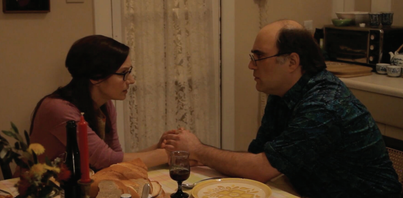Film ReviewsLove and Taxes: Reality Knocks HardMar 22, 2017 Anchorage Press
|
|

San Francisco in the early 2000s was teeming with young, independent filmmakers and artists with so much energy it lit the scene on fire, that’s when the Kornbluth brothers, Josh and Jacob burst into the scene with Haiku Tunnel (HT), a film about a stellar temp worker who was less than stellar once his status changed from temp to permanent. Haiku Tunnel was reflective of the time in the City when one could make a living doing temp work because the area was awash with emerging tech companies and the banking and legal firms that serviced them. Then the market crashed and there was an exodus of unemployed people, but it is San Francisco after all and so it bounced back, richer and more gentrified than ever. Fast forward almost 15 years, and the Korthbluth brothers strike again with Love and Taxes (L&T) in what feels like, a closely and tightly written Haiku Tunnel saga, except that chronologically it would actually be more of a prequel, but not that it matters because the films and their respective subject matter stand on their own.
Like in Haiku Tunnel. The protagonist in Love and Taxes is Josh Kornbluth played by Josh Kornbluth, and it’s directed by Jacob Kornbluth. Love and Taxes builds on the charisma and following of the Kornbluth brothers and their team, thus calling on many of the same actors, playing the same or very similar characters as before: Sarah Overman plays Sarah in L&T and Julie Faustino in HT, Warren Keith who is known for his roles in Fargo, The Big Lebowski, and Raising Arizona plays Bob Shelby in both of the Kornbluth films. Actress Helen Shumaker is always notable, she plays Marlinna D’Amore in HT and Mo Glass in this film.
Unlike Haiku Tunnel, Love and Taxes does not focus on Josh’s work commitment issues, instead it follows Josh though his stand-up act at The Marsh where he confesses that he hasn’t filed taxes for seven years, to his actions to rectify this and get back in the system. The film is set up as combination of a dramatic onstage monologue and off stage live action that follows Josh on his daily routine and his relationships. The two devices are nicely balanced and the on stage sequences fill in the gaps in Josh’s thinking pattern for the viewers. Josh Kornbluth has an understated presence that allows him to keep the plot moving. He is corpulent and inconspicuous, he carries himself like in a daydream and is the first to be surprised when life happens to him.
As it turns out, filing tax returns begins Josh’s metamorphosis from man-child, to slightly more mature man-child who falls in love and needs to prepare for fatherhood. Along the way Josh has a series of “lessons learned” moments and even a civic epiphany about what it is to live in society; if Socrates can drink the hemlock, then Josh can pay his taxes.
If Love and Taxes feels like a cultish movie, it’s because it is, along with the brothers Kornbluth’s other productions. Their films capture a very specific time, place, and social circle, more importantly, they’re funny and quirky. They reflect the growing pains of generation X, and are unassumingly smart and cool—or as cool as they can be.
Showtimes:
- Art House-
Bear Tooth
Monday, 3/27
5:30 pm
Run time: 1:40 h
Movie Rating: Not rated.
Like in Haiku Tunnel. The protagonist in Love and Taxes is Josh Kornbluth played by Josh Kornbluth, and it’s directed by Jacob Kornbluth. Love and Taxes builds on the charisma and following of the Kornbluth brothers and their team, thus calling on many of the same actors, playing the same or very similar characters as before: Sarah Overman plays Sarah in L&T and Julie Faustino in HT, Warren Keith who is known for his roles in Fargo, The Big Lebowski, and Raising Arizona plays Bob Shelby in both of the Kornbluth films. Actress Helen Shumaker is always notable, she plays Marlinna D’Amore in HT and Mo Glass in this film.
Unlike Haiku Tunnel, Love and Taxes does not focus on Josh’s work commitment issues, instead it follows Josh though his stand-up act at The Marsh where he confesses that he hasn’t filed taxes for seven years, to his actions to rectify this and get back in the system. The film is set up as combination of a dramatic onstage monologue and off stage live action that follows Josh on his daily routine and his relationships. The two devices are nicely balanced and the on stage sequences fill in the gaps in Josh’s thinking pattern for the viewers. Josh Kornbluth has an understated presence that allows him to keep the plot moving. He is corpulent and inconspicuous, he carries himself like in a daydream and is the first to be surprised when life happens to him.
As it turns out, filing tax returns begins Josh’s metamorphosis from man-child, to slightly more mature man-child who falls in love and needs to prepare for fatherhood. Along the way Josh has a series of “lessons learned” moments and even a civic epiphany about what it is to live in society; if Socrates can drink the hemlock, then Josh can pay his taxes.
If Love and Taxes feels like a cultish movie, it’s because it is, along with the brothers Kornbluth’s other productions. Their films capture a very specific time, place, and social circle, more importantly, they’re funny and quirky. They reflect the growing pains of generation X, and are unassumingly smart and cool—or as cool as they can be.
Showtimes:
- Art House-
Bear Tooth
Monday, 3/27
5:30 pm
Run time: 1:40 h
Movie Rating: Not rated.